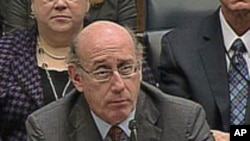A top Treasury Department official has ordered pay cuts for the 25 highest-paid executives at seven companies that received government bail-outs. But he says he doesn't want broader powers to reduce salaries in the rest of the U.S. financial sector.
Call him the pay czar. That's what some members of Congress did when lawyer Kenneth Feinberg outlined his plan for executive pay cuts.
"Let's be straight about this, 'You are the czar. You make the decision and that is it," Republican Congressman Dan Burton, of Indiana said.
"My job was created by Congress in the Treasury to establish compensation determinations designed with one primary objective in mind: to get the taxpayer's money back," Feinberg responded.
Feinberg addressed Congress October 28 for the first time since he announced that the pay for executives at seven firms that received government funds to stay afloat would be cut by half.
"We greatly reduced the amount of cash that would be made available to these senior officials. We reduced that cash by approximately 90 percent," Feinberg said.
Instead, Feinberg says large portions of executives' pay will be tied to stock that can't be immediately cashed out. He recommended similar action for the broader market, and said he wanted to take no further action himself.
"I am hoping that the report that I have issued and the recommendations I made to these seven companies will have some effect voluntarily in influencing how the private sector goes about establishing compensation practices," Feinberg said.
Some Republicans lawmakers feared that forcing executives to take big pay cuts would lead to a devastating brain drain at some of the nation's most important firms.
"Now if they jump ship and you don't have top talent running these companies the American taxpayer who is the majority stock holder has inferior people running them," Burton noted.
Representative Ed Towns said let them go.
"I am not too sure people will be excited about hiring people that failed," he said. "I don't think you have to worry about that too much."
The hearing came as Congress grapples with the role government should play in reigning in large companies whose collapse could affect the economy.
News
US 'Pay Czar' Proposes Executive Pay Cuts
update

<!-- IMAGE -->